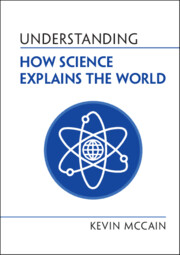Book contents
- Understanding How Science Explains the World
- Series page
- Understanding How Science Explains the World
- Copyright page
- Reviews
- Dedication
- Contents
- Foreword
- Preface
- Acknowledgments
- 1 Why Explanation Matters in Science
- 2 The General Nature of Explanation
- 3 Specific Kinds of Scientific Explanations
- 4 Explanation and Prediction
- 5 Evaluating Explanations
- 6 Explanatory Quality and Felt Understanding
- 7 False Theories, But Accurate Explanations?
- 8 From Explanation to Knowledge
- Concluding Remarks
- Summary of Common Misunderstandings
- References and Further Reading
- Figure Credits
- Index
Concluding Remarks
Published online by Cambridge University Press: 17 June 2022
- Understanding How Science Explains the World
- Series page
- Understanding How Science Explains the World
- Copyright page
- Reviews
- Dedication
- Contents
- Foreword
- Preface
- Acknowledgments
- 1 Why Explanation Matters in Science
- 2 The General Nature of Explanation
- 3 Specific Kinds of Scientific Explanations
- 4 Explanation and Prediction
- 5 Evaluating Explanations
- 6 Explanatory Quality and Felt Understanding
- 7 False Theories, But Accurate Explanations?
- 8 From Explanation to Knowledge
- Concluding Remarks
- Summary of Common Misunderstandings
- References and Further Reading
- Figure Credits
- Index
Summary
Summing up, in this book we have been doing some explaining – we have answered a number of “why” and “how” questions. Along the way we have cleared up a number of common misunderstandings (see the summary that follows for a list of these). Most importantly, we have explained why science seeks to explain the world – because this is how we come to have scientific understanding of the world. Additionally, we have explained “how” science explains the world – quite often it is by way of idealizing models that allow us to generate scientific hypotheses which provide explanations of phenomena. Once we have scientific hypotheses that potentially explain some phenomenon, we utilize our ability to evaluate the explanatory merits of hypotheses to determine which explanation is best. Then, we legitimately infer that the best explanation, if it is sufficiently good in its own right, is (probably) true. This is how we come to have scientific knowledge, and it is this scientific knowledge of explanations and hypotheses that yields genuine scientific understanding of phenomena.
Information
- Type
- Chapter
- Information
- Understanding How Science Explains the World , pp. 102 - 103Publisher: Cambridge University PressPrint publication year: 2022
